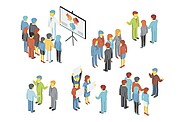Profile
Joep Cornelissen is Professor of Corporate Communication and Management at Rotterdam School of Management, Erasmus University. The main focus of his research involves studies of the role of corporate and managerial communication in the context of innovation, entrepreneurship and change. In addition, he also has an interest in questions of scientific reasoning and theory development in management and organization theory.
His work has been published in the Academy of Management Review, Academy of Management Journal, Journal of Management Studies, Organization Science and Organization Studies, and he has written a general text on corporate communication (Corporate Communication: A Guide to Theory and Practice, Sage Publications) which is now in its sixth edition (2020).
He is the Editor-in-Chief of Organization Theory, a former Associate Editor for the Academy of Management Review, a Council member of the Society for the Advancement of Management Studies, a former General Editor of the Journal of Management Studies (2006-2012) and serves on the editorial boards of the Academy of Management Journal, Academy of Management Review, the Journal of Management Studies and Organization Studies.
Publications
Article (50)
Academic (49)
-
Horner, S., Cornelissen, J., & Zundel, M. (2024). Panacea or Dangerous Practice: A Counterpoint to Hanisch's Argument for Prescriptive Theorizing. Journal of Management Studies, 61(4), 1717-1730. https://doi.org/10.1111/joms.13039
-
Solinger, O. N., Heusinkveld, S., & Cornelissen, J. P. (2024). Redefining concepts to build theory: A repertoire for conceptual innovation. Human Resource Management Review, 34(1), Article 100988. https://doi.org/10.1016/j.hrmr.2023.100988
-
Xu, J., & Cornelissen, J. (2023). Disequilibrium and complexity across scales: a patch-dynamics framework for organizational ecology. Humanities and Social Sciences Communications, 10(1), Article 211. https://doi.org/10.1057/s41599-023-01730-x
-
Pillai, K. G., Sharma, P., Cornelissen, J., Zhang, Y., & Nair, S. R. (2023). Theorising the dark side of interorganizational relationships: an extension. Journal of Business and Industrial Marketing, 38(12), 2578-2588. https://doi.org/10.1108/JBIM-01-2021-0041
-
Stephenson, K. A., Cornelissen, J. P., & Khapova, S. N. (2023). Upbeat or Off-the-Mark? How Work Rhythms Affect Strategic Change. Journal of Management Studies. https://doi.org/10.1111/joms.13018
-
Cornelissen, J., & Kaandorp, M. (2023). Towards Stronger Causal Claims in Management Research: Causal Triangulation Instead of Causal Identification. Journal of Management Studies, 60(4), 834-860. https://doi.org/10.1111/joms.12897
-
van Werven, R., Cornelissen, J., & Bouwmeester, O. (2023). The Relational Dimension of Feedback Interactions: A Study of Early Feedback Meetings Between Entrepreneurs and Potential Mentors. British Journal of Management, 34(2), 873-897. https://doi.org/10.1111/1467-8551.12615
-
Geradts, T., Jansen, J., & Cornelissen, J. (2022). Let's Profitably Fight Poverty, Shall We? How Managers Use Emotional Framing to Develop Base of the Pyramid Ventures Inside a Large Fast-moving Consumer Goods Company. Organization and Environment, 35(4), 579-606. https://doi.org/10.1177/10860266221095253
-
Jellema, S. F., Werner, M. D., Rasche, A., & Cornelissen, J. (2022). Questioning Impact: A Cross-Disciplinary Review of Certification Standards for Sustainability. Business and Society, 61(5), 1042-1082. https://doi.org/10.1177/00076503211056332
-
Cornelissen, J., Akemu, O., Jonkman, J., & Werner, M. (2021). Building Character: The Formation of a Hybrid Organizational Identity in a Social Enterprise. Journal of Management Studies, 58(5), 1294-1330. https://doi.org/10.1111/joms.12640
-
van Burg, E., Elfring, T., & Cornelissen, J. P. (2021). Connecting content and structure: A review of mechanisms in entrepreneurs’ social networks. International Journal of Management Reviews, 24(2), 188-209. https://doi.org/10.1111/ijmr.12272, https://doi.org/10.1111/ijmr.12272
-
Cornelissen, J., Hollerer, M., & Seidl, D. (2021). What Theory Is and Can Be: Forms of Theorizing in Organizational Scholarship. Organization Theory, 2(3). https://doi.org/10.1177/26317877211020328
-
Giessen, M., Langenbusch, C., Jacobs, G., & Cornelissen, J. (2021). Collective sensemaking in the local response to a grand challenge: Recovery, alleviation and change-oriented responses to a refugee crisis. Human Relations, 75(5), 903-930. https://doi.org/10.1177/00187267211004688
-
Xu, J., Peng, B., & Cornelissen, J. (2021). Modelling the network economy: A population ecology perspective on network dynamics. Technovation, 102, Article 102212. https://doi.org/10.1016/j.technovation.2020.102212
-
Chatterjee, I., Cornelissen, J., & Wincent, J. (2021). Social entrepreneurship and values work: The role of practices in shaping values and negotiating change. Journal of Business Venturing, 36(1), Article 106064. https://doi.org/10.1016/j.jbusvent.2020.106064
-
Stephens, V., Matthews, L., Cornelissen, J. P., & Rowlands, H. (2021). Building Novel Supply Chain Theory Using “Metaphorical Imagination”. Journal of Supply Chain Management, 58(1), 124-139. https://doi.org/10.1111/jscm.12257
-
Schildt, H., Mantere, S., & Cornelissen, J. (2020). Power in sensemaking processes. Organization Studies, 41(2), 241-265. https://doi.org/10.1177/0170840619847718
-
Wenzel, M., Cornelissen, J., Koch, JM., Hartmann, M., & Koch, M. (2020). Un)Mind the gap: How organizational actors cope with an identity–strategy misalignment. Strategic Organization, 18(1), 212-244. https://doi.org/10.1177/1476127019856524
-
Harley, B., & Cornelissen, J. (2020). Rigor With or Without Templates?: The Pursuit of Methodological Rigor in Qualitative Research. Organizational Research Methods. https://doi.org/10.1177/1094428120937786
-
Cornelissen, J., & Cholakova, M. (2019). Profits Uber everything? The gig economy and the morality of category work. Strategic Organization. https://doi.org/10.1177/1476127019894506
-
Clarke, JS., Llewellynn, N., Cornelissen, J., & Viney, R. (2019). Gesture analysis and organizational research: The development and application of a protocol for naturalistic settings. Organizational Research Methods. https://doi.org/10.1177/1094428119877450
-
Solinger, O., Jansen, PGW., & Cornelissen, J. (2019). The emergence of moral leadership. Academy of Management Review, 45(3), 504-527. https://doi.org/10.5465/amr.2016.0263
-
Sagath, D., van Burg, E., Cornelissen, J. P., & Giannopapa, C. (2019). Identifying design principles for business incubation in the European space sector. Journal of Business Venturing Insights, 11, Article e00115. https://doi.org/10.1016/j.jbvi.2019.e00115
-
van Werven, R., Bouwmeester, O., & Cornelissen, J. P. (2019). Pitching a business idea to investors: How new venture founders use micro-level rhetoric to achieve narrative plausibility and resonance. International Small Business Journal: Researching Entrepreneurship, 37(3), 193-214. https://doi.org/10.1177/0266242618818249
-
Cornelissen, J. (2019). Imagining futures for organization studies: The role of theory and of having productive conversations towards theory change. Organization Studies, 40(1), 55-58. https://doi.org/10.1177/0170840618767468
-
Wenzel, M., Cornelissen, J., Koch, J., Rothmann, W., & Senf, N. (2019). How Organizational Actors Live Out Paradoxical Tensions Through Power Relations: The Case of a Youth Prison. Organizational Behavior and Human Decision Processes, 155, 55-67. https://doi.org/10.1016/j.obhdp.2019.03.001
-
Cornelissen, J., & Hoellerer, M. (2019). An Open and Inclusive Space for Theorizing: Introducing Organization Theory. Organization Theory, 1(1). https://doi.org/10.1177/2631787719887980
-
Pfarrer, M. D., Devers, C. E., Corley, K., Cornelissen, J. P., Lange, D., Makadok, R., Mayer, K., & Weber, L. (2019). Sociocognitive perspectives in strategic management. Academy of Management Review, 44(4), 767-774. https://doi.org/10.5465/amr.2019.0185
-
Lounsbury, M., Cornelissen, J., Granqvist, N., & Grodal, S. (2018). Culture, innovation and entrepreneurship. Innovation: Management, Policy and Practice, 21(1), 1-12. https://doi.org/10.1080/14479338.2018.1537716
-
Logemann, M., Piekkari, R., & Cornelissen, J. (2018). The sense of it all: Framing and narratives in sensegiving about a strategic change. Long Range Planning, 52(5), Article 101852. https://doi.org/10.1016/j.lrp.2018.10.002
-
Clarke, JS., Cornelissen, J., & Healey, M. (2018). Actions speak louder than words: how figurative language and gesturing in entrepreneurial pitches influences investment judgments. Academy of Management Journal, 62(2). https://doi.org/10.5465/amj.2016.1008
-
Savage, P., Cornelissen, J., & Franck, H. (2017). Fiction and organization studies. Organization Studies, 39(7), 975-994. https://doi.org/10.1177/0170840617709309
-
Cornelissen, J. (2017). Preserving Theoretical Divergence in Management Research: Why the Explanatory Potential of Qualitative Research Should Be Harnessed Rather than Suppressed. Journal of Management Studies, 54(3), 368-383. https://doi.org/10.1111/joms.12210
-
Wickert, C., Vaccaro, A., & Cornelissen, J. (2017). Buying corporate social responsibility: Organizational identity orientation as a determinant of practice adoption. Journal of Business Ethics, 142(3), 497-514. https://doi.org/10.1007/s10551-015-2740-z
-
Cornelissen, J. (2017). From the editors: Developing propositions, a process model or a typology? Addressing the challenges of writing theory without a boilerplate. Academy of Management Review, 42(1), 1-9. https://doi.org/10.5465/amr.2016.0196
-
Ketokivi, M., Mantere, S., & Cornelissen, J. (2017). Reasoning by analogy and the progress of theory. Academy of Management Review, 42(4), 637-658. https://doi.org/10.5465/amr.2015.0322
-
Haslam, SA., Cornelissen, J., & Werner, M. (2017). Metatheories and metaphors of organizational identity: integrating social constructionist, social identity, and social actor perspectives within a social interactionist model. International Journal of Management Reviews, 19(3), 318-336. https://doi.org/10.1111/ijmr.12150
-
Schoeneborn, D., Vasquez, C., & Cornelissen, J. (2016). Imagining organization through metaphor and metonymy: Unpacking the process-entity paradox. Human Relations, 69(4), 915-944. https://doi.org/10.1177/0018726715612899
-
Van grinsven, M., Heusinkveld, S., & Cornelissen, J. (2016). Translating Management Concepts: Towards a Typology of Alternative Approaches. International Journal of Management Reviews, 18(3), 271-289. https://doi.org/10.1111/ijmr.12106
-
Christensen, L. T., & Cornelissen, J. (2015). Organizational transparency as myth and metaphor. European Journal of Social Theory, 18(2), 132-149. https://doi.org/10.1177/1368431014555256
-
Ueberbacher, F., Jacobs, CD., & Cornelissen, J. (2015). How Entrepreneurs become Skilful Cultural Operators. Organization Studies, 36(7), 925-951. https://doi.org/10.1177/0170840615575190
-
Cornelissen, J., Durand, R., Fiss, PC., Lammers, JC., & Vaara, E. (2015). Putting communication front and center in institutional theory and analysis. Academy of Management Review, 40(1), 10-27. https://doi.org/10.5465/amr.2014.0381
-
van Werven, R., Bouwmeester, O., & Cornelissen, J. (2015). The power of arguments: How entrepreneurs convince stakeholders of the legitimate distinctiveness of their ventures. Journal of Business Venturing, 4(1), 616-631. https://doi.org/10.1016/j.jbusvent.2014.08.001
-
Kroon, DP., Cornelissen, J., & Vaara, E. (2015). Explaining Employees' Reactions towards a Cross-Border Merger: The Role of English Language Fluency. Management International Review, 55(6), 775-800. https://doi.org/10.1007/s11575-015-0259-2
-
Corbett, A., Cornelissen, J., Delios, A., & Harley, B. (2015). Variety, novelty and perceptions of scholarship in research on management and organizations: An appeal for ambidextrous scholarship. Journal of Management Studies, 51(1), 3-18. https://doi.org/10.1111/joms.12032
-
Cornelissen, J., & Werner, M. (2014). Putting Framing in Perspective: A review of Framing and Frame Analysis across the Management and Organizational Literature. The Academy of Management Annals, 8(1), 181-235. https://doi.org/10.1080/19416520.2014.875669
-
Werner, M., & Cornelissen, J. (2014). Framing the Change: Switching and Blending Frames and their Role in Instigating Institutional Change. Organization Studies, 35(10), 1449-1472. https://doi.org/10.1177/0170840614539314
-
Cornelissen, J., Mantere, S., & Vaara, E. (2014). The contraction of meaning: The combined effect of communication, emotion, and materiality on sensemaking the stockwell shooting. Journal of Management Studies, 51(5), 699-736. https://doi.org/10.1111/joms.12073
-
Cornelissen, J., & Durand, R. (2014). Moving forward: Developing theoretical contributions in management studies. Journal of Management Studies, 51(6), 995-1022. https://doi.org/10.1111/joms.12078
Professional (1)
-
Cornelissen, J., & Kroon, DP. (2015). Post-merger integration and the role of language fluency. RSM Discovery - Management Knowledge, 24(4), 13-14. http://hdl.handle.net/1765/79319
Book (1)
Academic (1)
-
Cornelissen, J. (2017). Corporate communication: A guide to theory and practice. SAGE Publishing.
Chapter (8)
Academic (8)
-
Harley, B., & Cornelissen, J. (2019). Reframing rigor as reasoning: Challenging technocratic conceptions of rigor in management research. In Research in the Sociology of Organizations (pp. 59-76). Emerald Group Publishing. https://doi.org/10.1108/S0733-558X20190000059004
-
Wickert, C., & Cornelissen, J. (2017). Corporate social responsibility and reputation: Too much of a good thing? In J. Moon, M. Morsing, & A. Rasche (Eds.), Corporate Social Responsibility: Strategy, Communication and Governance (pp. 328-349). Cambridge University Press.
-
Cornelissen, J., Schoeneborn, D., & Vasquez, C. (2017). Deconstructing the Theoretical Language of Process Research: Metaphor and Metonymy in Interaction. In A. Langley, & H. Tsoukas (Eds.), Handbook of Process Organization Studies (pp. 607-615). SAGE Publishing. https://doi.org/10.4135/9781473957954.n39
-
Bangerter, A., & Cornelissen, J. (2017). Studying Discourse Processes in Institutional Contexts. In The Routledge Handbook of Discourse Processes, second edition Routledge.
-
Viney, R., Clarke, JS., & Cornelissen, J. (2017). Making meaning from multimodality: Embodied communication in a business pitch setting. In C. Cassell, A. L. Cunliffe, & G. Grandy (Eds.), The Sage Handbook of Qualitative Business and Management Research Methods: Methods and Challenges Sage.
-
Cornelissen, J., Haslam, SA., & Werner, M. (2016). Bridging and Integrating Meta-Theoretical Perspectives on organizational identity: A social Interactionist Model of Organizational Identity Development. In M. Pratt, M. Schultz, D. Ravasi, & B. Ashforth (Eds.), Handbook on Organizational Identity Oxford University Press.
-
Cornelissen, J. (2016). Morgan's Legacy in Theorizing and Understanding Organizations. In A. Ortenblad, K. Trehan, & L. L. Putnam (Eds.), Exploring Morgan’s Metaphors: Theory, Research, and Practice in Organizational Studies
-
Cornelissen, J., & Schildt, H. (2014). Sensemaking and strategy as practice. In D. Seidl, J. Balogun, E. Vaara, & D. Golsorkhi (Eds.), Handbook on strategy as practice Oxford University Press.
Conference contribution (3)
Academic (3)
-
Cholakova, M., & Cornelissen, J. (2018). Sailing towards an unknowable future: How different types of factual reasoning support early-stage entrepreneurial idea validation. 10th International Process Symposium on Temporality and History in Organization Studies, Halkidiki, Greece.
-
Cholakova, M., Cornelissen, J., & Andriopoulos, C. (2017). What if I do or I don’t, had or had not: The role of prefactual and counterfactual thinking in supporting entrepreneurial reasoning. Academy of Management Annual Meeting, Atlanta, USA. https://doi.org/10.5465/ambpp.2017.14432abstract
-
Cholakova, M., & Cornelissen, J. (2017). Being a permanent beta – How different types of factual reasoning support effective opportunity development. European Theory Development Workshop, Zurich, Switzerland.
Conference proceeding (3)
Academic (3)
-
Ravasi, D., Etter, M., Rindova, V., & Cornelissen, J. (2018). The formation of organizational reputation. In Academy of Management Annals http://hdl.handle.net/1765/110535
-
Harley, B., & Cornelissen, J. (2018). Reframing Rigor as Reasoning: Challenging Technocratic Conceptions of Rigor in Management Research. In Research in the Sociology of Organizations Emerald Group Publishing.
-
Gregoire, D., Dimov, D., Cornelissen, J., & Van den Burg, E. (2015). The mind in the middle: Taking stock of affect and cognition research in entrepreneurship. In International Journal of Management Reviews
Editorial (2)
Academic (1)
-
Van Burg, E., Stam, W., Cornelissen, J., & Jack, S. (2020). Advancing Qualitative Entrepreneurship Research: Leveraging Methodological Plurality for Achieving Scholarly Impact. Entrepreneurship Theory and Practice, OnlineFirst. https://doi.org/10.1177/1042258720943051
Popular (1)
-
Cornelissen, J., Höllerer, M. A., Boxenbaum, E., Faraj, S., & Gehman, J. (2024). Large Language Models and the Future of Organization Theory. Organization Theory, 5(1). https://doi.org/10.1177/26317877241239056
Foreword/postscript (1)
Academic (1)
-
Cornelissen, J. (2023). Foreword by Joep Cornelissen. In Handbook on Digital Corporate Communication (pp. xiii-xiv). Edward Elgar Publishing.
Meeting Abstract (1)
Academic (1)
-
Van der Maas, N., Nasserinejad, K., Pabst, T., Maertens, JA., Breems, DA., Manz, MG., Cloos, J., Ossenkoppele, GJ., Floisand, Y., Gradowska, P., Lowenberg, B., Huls, GA., Postmus, D., Pignatti, F., Cornelissen, JJ., & Versluis, J. (2022). Bayesian Inference for Optimization of Interim Analysis in Clinical Trials By Incorporation of Historical Data: Reanalysis of the HOVON AML 132 Clinical Trial. Blood, 140, 127-129. https://doi.org/10.1182/blood-2022-158137
Activities
Additional positions (1)
-
University of Liverpool Management SchoolStart date approval: 28 May 2024End date approval: 27 May 2027Place: LIVERPOOLDescription: advies en bijdrage in ontwikkeling vakgroep
Award
- ERIM Top Article Award (2018)
Courses
Developing Theory and Theoretical Contributions
- Study year: 2024/2025, 2023/2024, 2022/2023, 2021/2022, 2020/2021, 2019/2020, 2018/2019, 2017/2018, 2016/2017
- Code: BERMAMC017
- Level: PhD
Introduction to business
- Study year: 2023/2024, 2022/2023, 2020/2021
- Code: BK1201
- Level: Bachelor 1
Winter Foundation Course in Corporate Communication
- Study year: 2023/2024, 2022/2023, 2021/2022
- Code: BMCC1101
- ECTS: 8
Summer Foundation Course in Corporate Communication
- Study year: 2023/2024, 2022/2023, 2021/2022
- Code: BMCC1102
- ECTS: 8
Reputation Management
- Study year: 2023/2024, 2022/2023, 2021/2022, 2019/2020, 2018/2019
- Code: BMCC2001
- ECTS: 5
Corporate Branding
- Study year: 2023/2024, 2022/2023, 2021/2022, 2020/2021, 2019/2020, 2018/2019
- Code: BMCC2002
- ECTS: 5
Crisis Communication
- Study year: 2023/2024, 2022/2023, 2021/2022, 2020/2021, 2019/2020, 2018/2019
- Code: BMCC2003
- ECTS: 5
Employee Communication
- Study year: 2023/2024, 2022/2023, 2021/2022, 2020/2021, 2019/2020, 2018/2019
- Code: BMCC2004
- ECTS: 5
Leadership and Communication
- Study year: 2023/2024, 2022/2023, 2021/2022, 2020/2021, 2019/2020, 2018/2019
- Code: BMCC2006
- ECTS: 5
Navigating the Stakeholder Media Landscape
- Study year: 2023/2024, 2022/2023, 2021/2022, 2019/2020, 2018/2019
- Code: BMCC2007
- ECTS: 5
Corporate Responsibility
- Study year: 2023/2024, 2022/2023, 2021/2022, 2020/2021, 2019/2020, 2018/2019
- Code: BMCC2012
- ECTS: 5
Issues Management and Public Affairs
- Study year: 2023/2024, 2022/2023, 2021/2022, 2020/2021, 2019/2020, 2018/2019
- Code: BMCC2014
- ECTS: 5
Persuasive Communication
- Study year: 2023/2024, 2022/2023, 2021/2022, 2020/2021, 2019/2020, 2018/2019
- Code: BMCC2017
- ECTS: 5
Organisational Change
- Study year: 2023/2024, 2022/2023, 2021/2022, 2020/2021, 2019/2020, 2018/2019
- Code: BMCC2018
- ECTS: 5
Strategic Management for Communication Professionals
- Study year: 2023/2024, 2022/2023, 2021/2022, 2020/2021, 2019/2020, 2018/2019
- Code: BMCC2020
- ECTS: 5
Digital Communication
- Study year: 2023/2024, 2022/2023, 2021/2022, 2020/2021, 2019/2020, 2018/2019
- Code: BMCC2021
- ECTS: 5
Finance for Communication Professionals
- Study year: 2023/2024, 2022/2023, 2021/2022, 2019/2020, 2018/2019
- Code: BMCC2022
- ECTS: 5
Co-creation and Stakeholder Engagement
- Study year: 2023/2024, 2022/2023, 2021/2022, 2020/2021
- Code: BMCC2023
- ECTS: 5
Strategic Communication
- Study year: 2023/2024, 2022/2023, 2021/2022
- Code: BMCC2024
- ECTS: 5
Corporate Purpose, Leadership and Communication
- Study year: 2023/2024, 2022/2023
- Code: BMCC2025
- ECTS: 5
International Exchange
- Study year: 2023/2024, 2022/2023, 2021/2022, 2020/2021, 2019/2020, 2018/2019
- Code: BMCC3001
- ECTS: 8
Thesis
- Study year: 2023/2024, 2022/2023, 2021/2022, 2020/2021, 2019/2020, 2018/2019
- Code: BMCC4001
- ECTS: 15
Thesis
- Study year: 2023/2024, 2022/2023, 2021/2022
- Code: BMCC4014
- ECTS: 14
Corporate Social investors as a force for positive change
- Study year: 2023/2024, 2020/2021
- Code: BMME143
- Level: Master
Developing Theory and Theoretical Contributions
- Study year: 2023/2024
- Code: BPTPHD1202
- ECTS: 1
Introduction to Business
- Study year: 2023/2024, 2022/2023, 2020/2021
- Code: BT1201
- Level: Bachelor 1, Bachelor 1
Past courses
Summer Foundation Course in Corporate Communication
- Study year: 2020/2021, 2019/2020, 2018/2019
- Code: BMCC1002
- ECTS: 7
Winter Course in Corporate Communication
- Study year: 2020/2021, 2019/2020, 2018/2019
- Code: BMCC1001
- ECTS: 7
Introduction to business administration
- Study year: 2019/2020
- Code: BK1101
- Level: Bachelor 1
Investor Relations
- Study year: 2019/2020, 2018/2019
- Code: BMCC2005
- ECTS: 5
Language & Reputation Management
- Study year: 2019/2020, 2018/2019
- Code: BMCC2016
- ECTS: 5
Leadership development for communication managers
- Study year: 2019/2020, 2018/2019
- Code: BMCC2013
- ECTS: 5
Marketing Communication
- Study year: 2019/2020, 2018/2019
- Code: BMCC2008
- ECTS: 5
Organisational Identity
- Study year: 2019/2020, 2018/2019
- Code: BMCC2009
- ECTS: 5
Partnerships & Sponsoring
- Study year: 2019/2020, 2018/2019
- Code: BMCC2019
- ECTS: 5
Public affairs
- Study year: 2019/2020, 2018/2019
- Code: BMCC2010
- ECTS: 5
Strategic issues management
- Study year: 2019/2020, 2018/2019
- Code: BMCC2011
- ECTS: 5
Thought Leadership
- Study year: 2019/2020, 2018/2019
- Code: BMCC2015
- ECTS: 5
Publishing Strategy
- Study year: 2017/2018, 2016/2017
- Code: BERMSKL010
- ECTS: 1 Level: Master
Social Entrepreneurship
- Study year: 2017/2018
- Code: BMME080
- ECTS: 6 Level: Master, Master
Communicating Sustainability
- Study year: 2016/2017
- Code: BMME107
- ECTS: 6 Level: Master
Advanced Topics in Organization Theory
- Study year: 2015/2016
- Code: BERMASC012
- ECTS: 5 Level: Master
Developing Theory and Theoretical Contributions
- Study year: 2015/2016
- Code: BERMAMC014
- ECTS: 3 Level: Master
Featured in the media
-
‘Bedrijven als Uber moeten anders worden geclassificeerd’
Companies such as Uber, which supply on demand, must be classified differently. The category in which Uber wants to see himself classified is morally and legally doubtful, says new research by Magdalena Cholakova and professor…
Tuesday, 4 February 2020 -
‘Bedrijven als Uber moeten anders worden geclassificeerd’
Companies such as Uber, which supply on demand, must be classified differently. The category in which Uber wants to see himself classified is morally and legally doubtful, says new research by Magdalena Cholakova and professor…
Tuesday, 4 February 2020 -
‘BEDRIJVEN ALS UBER MOETEN ANDERS WORDEN GECLASSIFICEERD’
Companies such as Uber, which supply on demand, must be classified differently. The category in which Uber wants to see himself classified is morally and legally doubtful, says new research by Magdalena Cholakova and professor…
Tuesday, 4 February 2020 -
Winst Uber alles
Companies such as Uber, which supply on demand, must be classified differently. The category in which Uber wants to see himself classified is morally and legally doubtful, says new research by Magdalena Cholakova and professor…
Monday, 3 February 2020 -
Rotterdamse wetenschappers waarschuwen voor framing van bedrijven als Uber
An article regarding research done by Joep Cornelissen and Magdalena Cholakova into Uber.
Monday, 3 February 2020 -
Uber workers cling to “precarious” existence
An article regarding Joep Cornelissen's en Magdalena Cholakova's new research that examines Uber’s argument that its drivers are “independent workers” who are, in some respects, like individuals working for others and in other…
Friday, 31 January 2020 -
De keerzijde van een nieuw businessmodel: winst Uber alles
Digitization has brought us platforms such as Airbnb, Facebook and Uber. These are companies that rent out rooms without owning real estate, offering content without employing editors or arranging transport without owning cars.…
Friday, 31 January 2020 -
Nieuwe categorie schijnzelfstandigen 'moreel en juridisch twijfelachtig'
An article that discusses new research conducted by Joep Cornelissen and Magdalena Cholakova on Uber.
Thursday, 30 January 2020 -
Winst Uber alles
For employees, it is of great importance how companies like Uber, which supply on demand, are classified. The category in which Uber wants to see himself classified is morally and legally questionable, according to new research by…
Wednesday, 29 January 2020 -
Abstracte plannen overbrengen? Non-verbale communicatie wordt belangrijker
Joep Cornelissen, Professor of Corporate Communication and Management, has been mentioned in an article. The article discusses how an abstract story may be sold to the public. He states that "the type of language used is quite a…
Wednesday, 4 September 2019 -
Abstracte plannen overbrengen? ‘Non-verbale communicatie belangrijker dan taal’
Joep Cornelissen, Professor of Corporate Communication and Management, has been mentioned in an article. The article discusses how an abstract story may be sold to the public. He states that "the type of language used is quite a…
Thursday, 29 August 2019 -
When You Pitch an Idea, Gestures Matter More Than Words
An article in Harvard Business Review that discusses the influence of arm and hand motions during pitching. Hand motions help to communicate an abstract or unfamiliar idea by making it concrete, according to Joep Cornelissen,…
Wednesday, 1 May 2019 -
New Research Reveals The Surprising Nonverbal Technique That Makes Pitches More Convincing
An article in Forbes that discusses the influence of arm and hand motions during pitching. Hand motions help to communicate an abstract or unfamiliar idea by making it concrete, according to Joep Cornelissen, professor of…
Tuesday, 30 April 2019 -
Bol en NS winnen de Stakeholder Management Award 2018
Joep Cornelissen, Professor of Corporate Communication and Management at RSM was a member of the jury for the Stakeholder Management Award 2018.
Friday, 16 February 2018 -
Bol.com en NS winnen de Stakeholder Management Award 2018
Joep Cornelissen, Professor of Corporate Communication and Management at RSM was a member of the jury for the Stakeholder Management Award 2018.
Thursday, 15 February 2018 -
Cees van Riel verlaat Erasmus, Marijke Baumann en Joep Cornelissen nemen zijn taken over
Cees van Riel is retiring, and will be transferring his duties at RSM to Marijke Baumann and Joep Cornelissen. Marijke Baumann has been appointed the Director of the Corporate Communication Center (CCC) and Executive Director of…
Tuesday, 26 September 2017 -
Joep Cornelissen voorziet nieuwe communicatierealiteit
Joep Cornelissen of the Rotterdam School of Management (RSM) at Erasmus University is one of the speakers in the private RSM masterclass' Future Visions of Corporate Communication "on October 20. He first started with the good…
Friday, 4 November 2016 -
Wieneke Buurman in jury Reputatie Management Award
The jury for the Reputation Management Award has been expanded this year to include Wieneke Buurman (chairman of Logeion) and Joep Cornelisse. Reputation Management Award is the prize for the company with the most creative,…
Tuesday, 13 September 2016 -
Wieneke Buurman in jury Reputatie Management Award
The jury for the Reputation Management Award has been expanded this year to include Wieneke Buurman (chairman of Logeion) and Joep Cornelisse. Reputation Management Award is the prize for the company with the most creative,…
Tuesday, 13 September 2016 -
Reputatie Management Award geopend voor nominaties
The jury for the Reputation Management Award has been expanded this year to include Wieneke Buurman (chairman of Logeion) and Joep Cornelisse. Reputation Management Award is the prize for the company with the most creative,…
Tuesday, 6 September 2016 -
Winnaar gezocht: wie overtreft grensverleggend reputatiemanagement Rotterdam?
The jury for the Reputation Management Award has been expanded this year to include Wieneke Buurman (chairman of Logeion) and Joep Cornelisse. Reputation Management Award is the prize for the company with the most creative,…
Tuesday, 6 September 2016 -
Deze 7 trends bepalen de toekomst van communicatie
Communication company Linden & Barbosa organized a discussion with the experts in the field of communication to identify threats and opportunities, resulting in 7 future trends. J.P. Cornelissen is mentioned as participating in…
Tuesday, 1 December 2015 -
Bad Framing Leads to Bad Decisions and Bad (Even Fatal) Actions
A groundbreaking analysis of an innocent civilian’s tragic shooting by anti-terrorist police reveals an erroneous frame. A cautionary tale for leaders and other decision makers, exposing how errors or assumptions can cascade into…
Wednesday, 18 November 2015 -
Hoe de politie een onschuldige burger aanzag voor terrorist
A groundbreaking analysis of an innocent civilian’s tragic shooting by anti-terrorist police reveals an erroneous frame. A cautionary tale for leaders and other decision makers, exposing how errors or assumptions can cascade into…
Monday, 9 November 2015 -
Hoe de politie een onschuldige burger aanzag voor terrorist
An analysis of an innocent civilian’s tragic shooting by anti-terrorist police reveals how groups of individuals commit, through the interaction of communication, emotions and material cues, to a single, common frame. It exposing…
Monday, 9 November 2015 -
Corporate scandals and dealing with the aftermath
The impact of a corporate scandal on an organisation, its employees, customers and other stakeholder depends on the nature of the scandal, said Professor Joep Cornelissen, when interviewed by Reuters on the corporate scandal…
Monday, 19 October 2015 -
Bad Framing Leads to Bad Decisions and Bad (Even Fatal) Actions
An analysis of an innocent civilian’s tragic shooting by anti-terrorist police reveals how groups of individuals commit, through the interaction of communication, emotions and material cues, to a single, common frame. It exposing…
Sunday, 18 October 2015 -
When Bad Framing Leads to Bad Group Decisions and Fatal Actions
An article concerning the award-winning research that considers what causes individuals in teams to commit themselves to a single frame as opposed to being open to alternative framings. The research is co-written by professor Joep…
Tuesday, 1 September 2015





